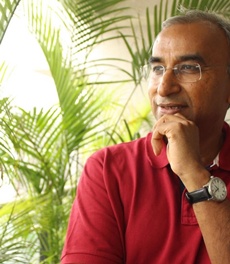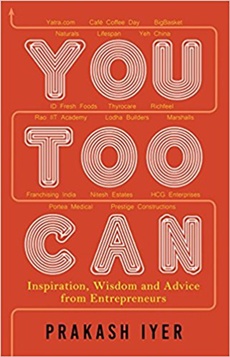Beyond the comfort zone
04 Aug 2017
Former managing director of Kimberly Clark Lever, Prakash Iyer is now a best-selling author, leadership coach and a motivational speaker.
 Passionate about cricket, Iyer speaks and writes extensively on motivation, leadership, teamwork and winning. His first book, The Habit of Winning, was shortlisted for the Economist Crossword Popular Book Award, and has been translated into seven languages. His second book, The secret of leadership, was published in 2013. Both books are national bestsellers.
Passionate about cricket, Iyer speaks and writes extensively on motivation, leadership, teamwork and winning. His first book, The Habit of Winning, was shortlisted for the Economist Crossword Popular Book Award, and has been translated into seven languages. His second book, The secret of leadership, was published in 2013. Both books are national bestsellers.
In this interview with Swetha Amit, Iyer talks about the nuances of a good entrepreneur, importance of getting out of the comfort zone and the future of entrepreneurship in India.
It's been a while since your last book Secret of Leadership was released. How and when did you conceive the idea behind You Too Can?
The Times of India and its Brand Capital were celebrating 10 years of its existence. Brand Capital invests on small businesses and helps them grow. So they were looking to celebrate their 10th anniversary with a book that would facilitate entrepreneurship and help young people who were looking to turn into entrepreneurs. When they reached out to me and asked if I was willing to write this, I agreed. The idea was to speak to the people whose businesses they had invested in and try to pull out some inspiring stories or lessons from their journey. I went and met these several entrepreneurs and shortlisted 20 stories which I felt were different and interesting.
The intention was to capture their journey and identify if they were stories that we could pick up lessons from. My previous 2 books had stories which tried to teach us a few things. You Too Can is similar in this aspect but different as well since it deals with real people - those who dared to do something different. What fascinated me about each of these stories was the fact none of them talked about the usual how to raise capital or being customer centric. Each of them actually had a story behind their entire journey while taking a plunge into this road less travelled.
Many are seen venturing into the entrepreneurial road-some facing a roaring success while others faced setbacks. So what does it take to be a good entrepreneur?
A good entrepreneur is someone who is passionate about a certain idea and wants to make a difference with that idea. They are willing to learn and do not exhibit a 'know- it- all' attitude. When people are passionate about something, they have a tendency to start believing themselves to be experts. This is not a case with a good entrepreneur.
Another trait that is common with such people is the fact that they are willing to work very hard. These are individuals who have stepped out of their comfort zone of a corporate life where they are used to getting things done. Now they are prepared to dirty their hands and face the several setbacks that come their way. They also believe that they will bounce back despite their failures and find an alternative way to make their ideas work.
Speaking of comfort zones, your book states that staying in one's comfort zone will not work. How does one ensure they are out of the comfort zone?
There are two things you can do to stay out of your comfort zone. First is to ensure that you get the mind-set of a learner. If you think you have got it all right, you will never be open to learning new things. However on the other hand, if you are all time a little worried about the way you do things and constantly asking yourself questions, you have developed the mind-set of a learner and slowly stepping out of your comfort zone to seek newer possibilities.
The other thing is to adopt the attitude of being willing to lose. You have to mentally prepare yourself for the worst and not get scared of failure. Many of us have this imaginary baggage with trying and failing. We feel that if we fail, we will be looked down upon and considered a failure. If you try, who knows you may succeed. However if you don't try you will never succeed.
An interesting line in your book states ''Don't get distracted by newer ideas that could take you away from your original objective.'' Considering how easy it is to get swayed in the spirit, how does one ensure they stick to their core idea?
I think it's important for entrepreneurs to be flexible and look for newer ways to reach their destination rather than being fixated with only one approach. I like the new phrase which says to' pivot your business model'. Pivoting is all about looking at the goal differently and another way to do things rather than jumping from one business idea to another. While the core idea can remain the same, entrepreneurs should not be obsessed with their approach and be willing to change course, tactics and strategy to get there.
While we are on the topic of core values, in the case of ID as mentioned in your book, Mustafa lost out on a business as the deal went against his core principles and practices. Sometimes one loses out huge prospects due to sentimental vales. How does one attain a balance?
Everybody has to find their optimal balance. The key is to define what's important to you and what you are not willing to compromise on. I think if you make your stance clear then you will not end up doing the wrong thing. It's not for somebody else to decide between the right and wrong but for yourself. In some cases it's easy to define the wrong especially in cases where a law must not be broken and adhered to.
Everyone has their own set of values, which they follow strictly. In the case of Mustafa, his religious sentiments were important and he did not want to go against them. I believe that if you believe in something, you should stay true to it. It's easier to get drawn into temptations and pressurised into doing the wrong things to attain success. If you have the courage to be true to yourself, you will be a lot happier and success will eventually come knocking at your door even though it may take a little while.
Another interesting line states that ''be detached yet be completely passionate''. Considering both are at opposite ends, how do think this can be attained while doing business?
Lot of times success comes out of doing two seemingly opposite things. You can be completely passionate about what you are trying to achieve. However if you start thinking that you are the centre of that entire process, that's when the trouble begins. You will start being egoistic, not hire people who are better than you for the fear of losing out your importance and identity. In short, you will end up becoming a control freak and that isn't healthy for any business. So this is where the sense of detachment comes in. You must learn to let go and be detached. At the same time, you must be passionate enough to give that idea a sense of direction.
 | |
| Publisher: The Times Group Books Price: Rs 214 |
Some entrepreneurs are school / college dropouts while others claim that an MBA degree has enhanced their entrepreneurial skills further. How important is a degree or formal education when it comes to entrepreneurship which many have claimed cannot be taught just like in the case of leadership?
I probably have a different view on this. We all hear of how Steve Jobs or Bill Gates dropped out of educational institutions and succeeded. I think we should be careful not to think that dropping out is the reason for success. There is no direct correlation between dropping out of school/college and becoming an entrepreneur.
In current times, I feel that it's good to have some sort of an education and not necessarily a MBA degree. I advise students not to drop out as dropping out means allowing yourself to say that you could not stick on with what you started. In the journey of being an entrepreneur, there will be several occasions which will compel you to give up. However you should not give in so easily and learn to fight your way through. By completing your education you are showcasing your resilience and ability to finish what you started off with.
Do you also feel that a corporate exposure helps a person in the journey of entrepreneurship?
I think a lot of people should be open to learning and sometimes it helps when that learning comes from a corporate exposure. There is something that you can learn from a corporate environment.
Sometimes when you are working on a project, you will be a part of a team or a group and you can incorporate a lot of learning from them. You also learn to work with other people and respect each other's view points in the process. So yes a corporate exposure does help. You develop that openness in thinking when you are on the road to entrepreneurship.
The entrepreneurial bug has certainly caught on as we see many eager to venture into start-ups. So how do you see the future of entrepreneurship going forward in India?
Well I see a lot of start-ups happening today. This takes me back to a saying which I thought summed up entrepreneurs. If you look back and reflect what was it that made the entrepreneurs the way they are, the phrase I come across is Vuja de which is the opposite of Déjà vu. Déjà vu is when you see something new for the first time and feel that you have seen it before. We see something new and try to fit it into the world we know.
Vuja De is when we see the same thing every day and feel a wow factor of seeing something new. Entrepreneurs are built in the latter manner. They see the same thing every day and feel that they are seeing something new which makes them come up with some good ideas and solutions. Young people around us possess the ability of not being caught up in the past or trying to fit older solutions to new problems. That's probably the reason why they succeed.
They are fearless as compared to the older generation who were worried about steady income and working for large corporations. All those notions have disappeared and today people are happy to talk about their passions and do something to make a difference. I think the environment today is conducive for entrepreneurship and attaining capital is no longer a constraint. Money is available if you have a good idea to execute. So overall these are good times for entrepreneurship.
(Also See: Excerpt from You Too Can)


















